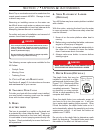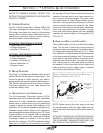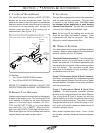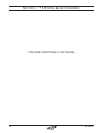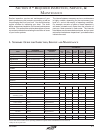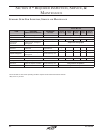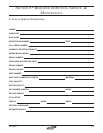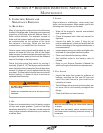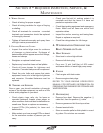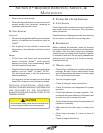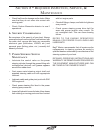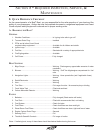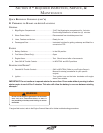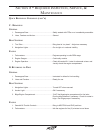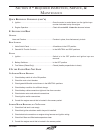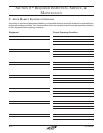
8.540 Outlaw
®
SeCtiOn 8 • required inSpeCtiOn, ServiCe, &
MaintenanCe
• Check your rst aid kit, making certain it is
complete and that the items in it have not
passed an expiration date.
• Check the signaling equipment and emergency
flares. Make sure all items are within their
expiration dates.
• Inspect the anchor, mooring, and towing lines.
Repair or replace as required.
• Check re extinguishers for full charge.
4. WinTerizaTion checklisT for
boaTs sToreD on lanD
a. boaT sToraGe
• Store boat in a bow high attitude.
• Remove hull drain plug.
• Pour one (1) pint (half-liter) of 50% water/
antifreeze mixture in each bilge pump sump.
b. enGine
• Flush engine with fresh water.
• Remove engine drain plugs.
REFER TO YOUR ENGINE OPERATOR’S
MANUAL FOR DETAILED INFORMATION ON
PREPARING THE ENGINES FOR STORAGE AND
WINTERIZATION.
c. baTTerY(ies)
• Remove from boat. Remove the negative (-)
cable rst, then the positive (+) cable.
• Remove grease and dirt from top surface.
• Grease terminal bolts.
• Store on wooden pallet or thick plastic in a cool
dry place. Do not store on concrete.
4. WirinG sYsTeM
• Check all wiring for proper support.
• Check all wiring insulation for signs of fraying
or chang.
• Check all terminals for corrosion - corroded
terminals and connectors should be replaced
or thoroughly cleaned.
• Tighten all terminals securely and spray them
with light marine preservative oil.
5. fiTTinGs, hoses anD claMps
• Inspect the entire bilge area for evidence
of damage or deterioration. Evidence of
deterioration will rst appear around hull ttings,
hoses and clamps.
• Straighten or replace kinked hoses.
• Replace any hose that does not feel pliable.
• Check all hose clamps for tightness and
corrosion. Corroded clamps must be replaced.
• Check the nuts, bolts and screws that retain
equipment, hoses, etc. in the bilge for tightness
and corrosion. Corroded fasteners must be
replaced.
b. TopsiDe anD supplies
Once a year, you should undertake a thorough
review of the topside equipment, as well as of the
critical safety supplies on your boat.
• Check cleats, rings, rails, etc. for loose or
corroded fasteners, breaks, sharp edges, or
other conditions that could lead to malfunction or
unsafe use. Repair or replace as necessary.
• Inspect PFDs (life jackets) for tears and
deterioration.
• Make certain you have enough PFDs on board
for the maximum number of persons you can
carry.



